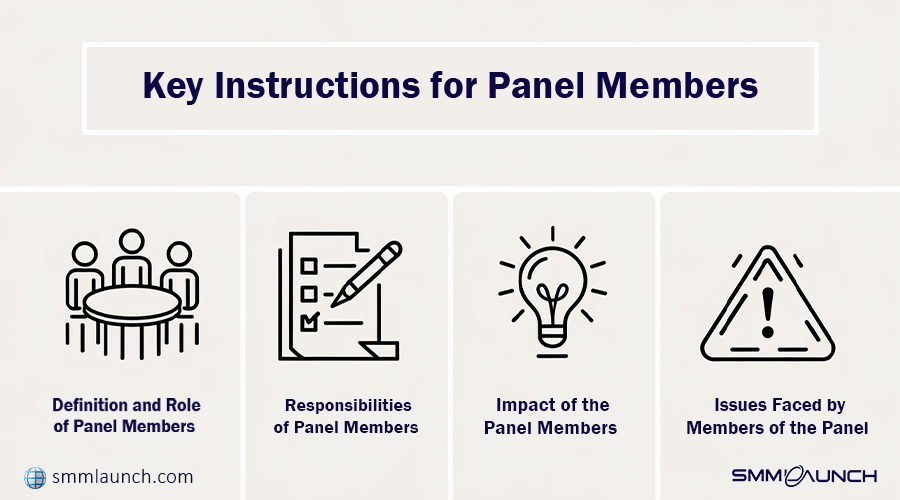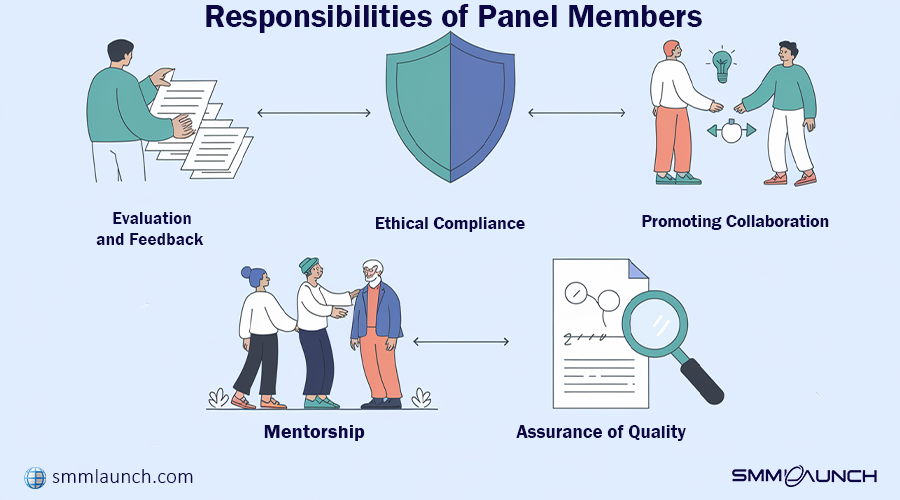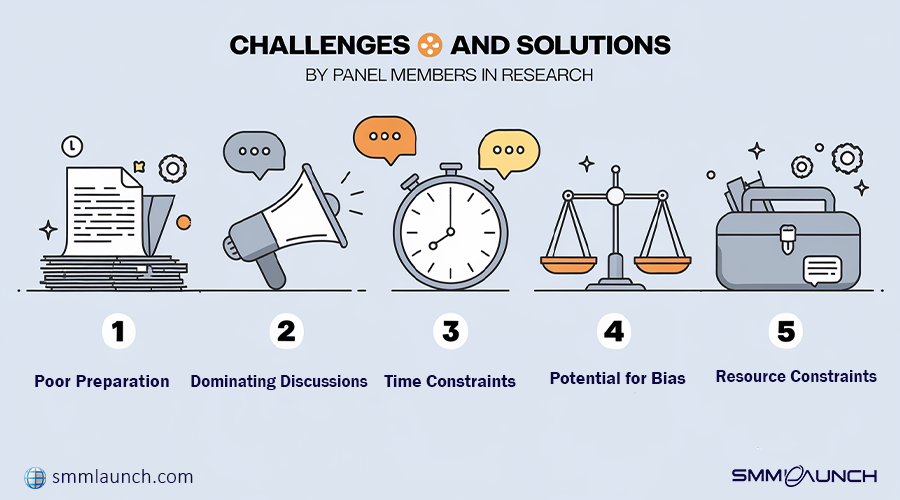
Panel Members in Research: Insights and Contributions
In a world of research where breakthroughs and discoveries depend on the tiniest bit of precision and insight, collaboration plays a pivotal role. Indeed, research teams comprising individuals with diverse expertise are more capable of generating innovative solutions with more accurate conclusions compared to isolated researchers.
Panel members are unsung heroes in the research process, offering their expertise, views, and critical evaluations to shape the direction and integrity of studies. Their input is invaluable, as they bring a balance of specialized knowledge, objectivity, and scrutiny that moves the research forward. Such people are often chosen because of their unique experience and skills, which greatly help in formulating hypotheses, analyzing data, and even publishing research results.
Table of Contents
Key Instructions for Panel members in research:
- A. Definition and Role of Panel Members
- B. Responsibilities of Panel Members
- C. Impact of the Panel Members
- D. Issues Faced by Members of the Panel
Challenges and Solutions Panel members in research:
- 1. Poor Preparation
- 2. Dominating Discussions
- 3. Time Constraints
- 4. Potential for Bias
- 5. Resource Constraints
Key Instructions for Panel members in research
Divide this section (Key Instructions for Panel Members) into clear subsections for better readability:

A. Definition and Role of Panel Members
The panel members are usually those people who are selected to advise, review, and give valuable inputs during research, based on their expertise and experience. They are usually selected from various academic or professional backgrounds with specialized knowledge, contributing to the in-depth quality of research. It is customary for panel members to be used during the following instances of research:
• Proposal Review: Members of the panel review proposals with regard to feasibility, ethics, and trend awareness in the research objectives. Their inputs help in fine-tuning ideas and frameworks while certain projects are still within the proposal stage.
Ethics Review: This will include members of the panel, especially in institutional review boards or ethics committees, who are charged with the responsibility to make sure that research is done accordingly to meet ethical standards that protect the rights and safety of participants and guarantee adherence to applicable regulations.
• Project Guidance: The panel members are able to provide guidance throughout the research in keeping methodologies appropriate, having data collected rigorously, and making adjustments where warranted. Their input serves to keep the focus of the research and aids researchers in overcoming challenges.
•Final Evaluation: The members of the panel review the findings when the research is complete to ensure that the conclusions are valid and supported by data, with significant relevance to the scientific community or society. They advise on further study or improvements.
B. Responsibilities of Panel Members
Panel members in research are entrusted with several key duties that shape the trajectory and outcomes of research projects. These responsibilities include:
• Evaluation and Feedback: Evaluating the quality of research at various stages, including reviewing proposals, commenting on methodologies, and critiquing results to ensure that the research meets established standards.
• Ethical Compliance: Ensuring ethical integrity through monitoring and enforcement of compliance to ethical guidelines that protect participant welfare and maintain the integrity of the research process.
• Promoting Collaboration: Panel members would especially, in multidisciplinary research settings, facilitate collaboration between different groups of researchers representing different disciplines on gaps in knowledge and approach that will help upgrade the whole research design.
• Mentorship: This will mostly be academic or early-career research settings where panel members act as mentors who are supposed to guide junior researchers on issues such as methodology, study design, and scholarly communication while navigating challenges in the research process.
• Assurance of Quality: Ensuring that the research maintains high standards in terms of methodology, analysis, and presentation. Advising on how consistency, accuracy, and transparency are kept in the process of research.

C. Impact of the Panel Members
The influence of Panel members in research can be transformative, enhancing various aspects of the research process and its final outcome:
• Innovation: To contribute to the creation of new ideas, expand the frontiers of research by fostering innovative thinking in solving problems and developing theory.
• Relevance to the Needs of Society and Industry: Ensuring that the research remains relevant and can be useful in real life by providing insights into trends, needs of society, and industry demands.
• Accountability: Ensuring the accountability of research to high standards by monitoring honest data collection, rigorous hypothesis testing, and transparent reporting.
• Credibility of Research Outputs: To enhance the credibility of research outputs through critical evaluation to make sure the findings are robust, scientifically sound, and contribute meaningfully to the field.
D. Issues Faced by Members of the Panel
While panel members play a very important role, they face numerous challenges that impede them in the performance of their duties:
• Time Constraints: Varied responsibilities between multiple projects mean that there isn't always the time needed to engage deeply in the research process, from looking at proposals and making the last selections.
• Potential for Bias: Personal prejudices or biases, either conscious or unconscious, might cloud the judgment of a panel member. Objectivity and fairness are cardinal, yet not so easy to ensure, particularly when research areas are polemical or of a very narrow specialty.
• Resource Limitations: In those cases when panel members are volunteers or even from institutions on shoestring budgets, there are just not enough resources to give substantial support or extensive reviews on certain aspects of the research. Overcoming these challenges requires commitment to continuous professional development, open communication, and ensuring panel members have the resources and support to carry out their roles.
Challenges and Solutions Panel members in research
Panel members are crucial in the processes of research, but they face a number of challenges in their
performance. Identifying these challenges and introducing methods of handling them is what will keep research efforts going in their integrity and success.

1. Poor Preparation
Challenge: Sometimes, the panel members are poorly prepared for either
meetings or discussions, thereby making poor evaluations and recommendations.
Solution: To better prepare attendees, meeting organizers should distribute
voluminous materials and clear agendas long before the dates of the meeting.
This gives the panel members time to read through the documents at length and
fosters a more substantial and valuable discussion.
2. Dominating Discussions
Challenge: Certain panel members might dominate conversations, potentially
stifling diverse perspectives and hindering collaborative decision-making.
Solution: The adoption of the format of structured meetings may perhaps help
compel the principle of balanced participation. It is also applicable to use
techniques, such as round-robin sharing, where every member gets to say his or
her views in turn to encourage equal contributions. Setting the expectation of
respectful, inclusive communication might also help foster collaboration within
the team.
3. Time Constraints
Challenge: Panel members often have limited time to devote to research
projects, which can affect their ability to provide thorough evaluations and
guidance.
Solution: In order to reduce bias, it is helpful to have set criteria for evaluation and to ask panel members to focus on objective data and evidence. Facilitating open discussions in which different viewpoints are considered may also help identify and address potential biases.
4. Potential for Bias
This carries with it the risk that the panel members may, albeit inadvertently, inject into an evaluation some element of personal bias that will undermine objectivity in the entire research undertaking.
Solution. In order to reduce bias, it is helpful to have set criteria for evaluation and to ask panel members to focus on objective data and evidence. Facilitating open discussions in which different viewpoints are considered may also help identify and address potential biases.
5. Resource Constraints
Challenge: Panel members may not have access to various important resources,
be it data or tools, sometimes even support; this would further impede them in
the execution of their responsibilities.
Solution: All members of the panel should be allowed access to all resources
related to their work. In some instances, organizers should provide materials
and support, and even offer training or workshops that would help equip panel
members with necessary skills and knowledge for doing their job.
The meeting of such challenges
proactively by a research team has the beneficial effect of improving the
effectiveness of the panels for the delivery of robust, credible research
output.
Conclusion
In this essay, we have looked at the position of panel members throughout the research process: from reviewing proposals to monitoring ethics, providing guidance on the project, and finally evaluating.
Moreover, SMMLaunch is here to enlarge all your boundaries around online prominence, offering affordable Telegram marketing services, adding tints like only premium members who will get interested in the issues of your channels, offering needed views, etc. With a very responsive platform available and support team backing 24/7, this promising guaranteed results ensures fast, reliable, and realizable social growth across all desired Medias.
Their roles range from assessment and feedback provision to ensuring ethics compliance and the encouragement of collaboration; hence, their role is paramount as far as the validity and success of research studies are concerned. Additionally, their influence facilitates innovation, directs activities toward the needs of society and industry, and strengthens the credibility of the research findings. However, panel members often face challenges such as time constraints, potential biases, and resource limitations. Addressing these issues through clear instructions, structured discussions, and adequate support is crucial for effective participation.
Providing clear and effective instructions to panel members is paramount. Clear and concise instructions make it easier for panelists to participate effectively, minimizing confusion and improving the accuracy of the data collected.
A well-prepared panel has the power to spark ideas, inspire change, and leave a lasting impression on its audience. By ensuring that panel members are well-prepared and supported, we can harness their collective expertise to drive meaningful advancements in research.

